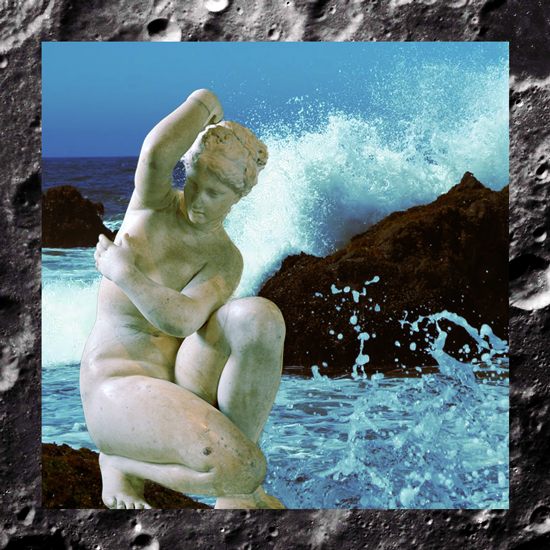Read all previous posts in Asymptote’s “Mimes” translation project here.
Mime XIV. The Parasol of Tanagra
Thus extended by my moulded rods, plaited with clay straw or woven with earthen fabric reddened by firing, I am held to the rear and towards the sun by a young girl with beautiful breasts. With the other hand she lifts her tunic of white yarn, and above her Persian sandals one may perceive ankles fashioned for electron rings to adorn. Her hair is wavy and a large pin traverses it at the nape of her neck. Averting her head she reveals her fear of the sun; she resembles Aphrodite come to incline her head.
Such is my mistress and earlier we have roamed through the meadows strewn with hyacinths, when she was in the rosy flesh and I made of yellow straw: the white sunshine kissed me on the outside, and below my dome I was embraced by the fragrance of the virgin’s hair. And the Goddess who transforms things having granted my wish, akin to a water-swallow falling with spread wings to caress with its beak a blossom born in the midst of a pond, I gently plunged onto her head. I lost the reed maintaining me far from her in the air, and became the hat covering her with a quivering roof.
But having spotted us in a suburb of the city, a potter who also sculpted young girls asked us to pause while he rapidly formed a small earthen figure under his thumbs. Labourer of lesser forms, he translated us into his clay language; and although he could certainly weave me delicately, softly fold the white woollen tunic and undulate my mistress’s hair, he failed to comprehend the pent-up desire of things, cruelly separating me from the head I loved; and becoming a parasol again in my novel life, I balance once more far away from my mistress’s neck.
Mime XV. Kinné
I consecrate this altar to the memory of Kinné. Here, near the black rocks where the foam breaks, we both have roved. The pierced strand knows it, and the wood of rowan trees and the bulrush of the sand and the yellow-headed sea poppies. Her hands were full of veined shells and I filled her trembling conch-like ears with kisses. She laughed at the crested birds perching on seaweed with their bobbing tails. In her eyes I saw the long line of white light drawing the boundary between brown earth and blue sea. Her feet, to her ankles, were immersed in the water and little sea creatures hopped upon her woollen tunic.
We loved the brilliant evening star and the misty crescent of the moon. The ocean-crossing wind brought us spicy scents of foreign lands. Our lips were white with sea-salt and we watched translucent, soft-shelled animals glisten through the water, like animated lamps. Aphrodite’s breath encircled us.
And I know not why the Good Goddess lulled Kinné to sleep. She fell among the yellow poppies of the sands in the rosy light of the morning star. Her mouth shed blood and the light of her eyes was extinguished. Between her eyelids I saw the black line that marks the disunion of those who rejoice in the sun and those who weep by the swamps. At present Kinné walks alone on subterranean shores, and her conch-shelled ears ring with the murmur of flying shadows; on the infernal strand sad poppies swing their black heads, and the star of Persephone’s obscure sky has neither evening nor dawn, but resembles a withered daffodil.
***
Ouvrier des formes inférieures, il nous a portées dans son langage d’argile; et, certes il a su me tresser délicatement et plier avec mollesse la tunique de laine blanche, et onduler la chevelure de ma maîtresse; mais ne comprenant pas le désir des choses, il m’a cruellement séparée de la tête que j’aimais; et redevenue ombrelle dans ma seconde vie, je me balance loin de la nuque de ma maîtresse.
I confess. I could not refrain myself from taking porter—to carry—and stretching its meaning to incorporate to carry across, that is: to translate. Etymologically speaking, this seemed to be a lesser crime. Translators of the world unite in judgement!
Yet is it not the fear of all labourers of the word to masterfully render them, their forms, sounds and textures, gingerly carrying them from one language to another, but to fall short in front of the unexpressed essence of a text?
Mime XIV, I believe, deals with the transformative power of poetry. For who is the Goddess who transforms things, if not Literature itself? Despite its allegorical scope, it confronts the issue straightforwardly. A parasol may become a quivering hat become a tender lover. A couple of unassuming sentences furtively become literature.
By translating these Mimes into my very own clay language, rendering their subtle allusions more visible, do I not belie the mistress´s concern of overexposure to the sun, to the light? I can merely hope not to have separated the sunshade from its beloved head, not to have failed the pent-up desire of things, words squarely among them.
***
Veronka Köver is Asymptote’s Belgium Editor-at-Large. She was born in Germany and has lived in Scotland, England, and France. Having studied anthropology, cultural studies, and literature, she currently works as an academic editor in the field of social sciences at the Université catholique de Louvain. A translator, she renders texts from French, German, and Hungarian into English and German. She translates philosophical and historical monographs as readily as experimental sound poetry. She lives in Brussels, a city as fragmentary and layered as she.

